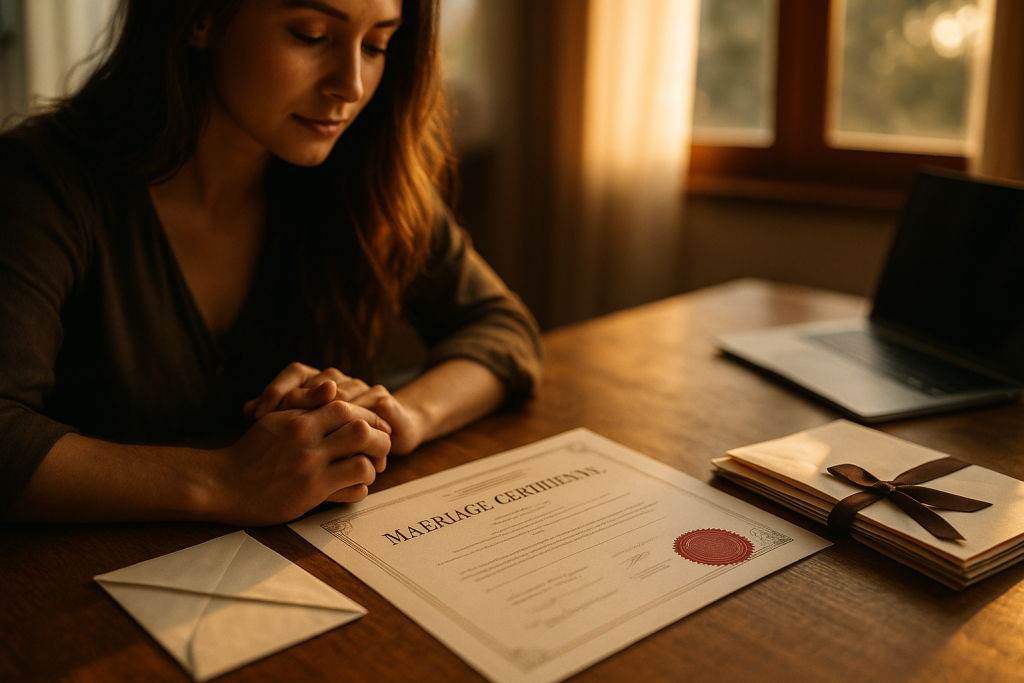Hey there! Thinking about tying the knot online? Virtual marriage ceremonies are becoming increasingly popular, offering couples a convenient and unique way to say “I do.” But before you jump into planning your Zoom wedding, it’s essential to ensure everything is legally sound. Here’s a comprehensive legal checklist to guide you through the process.
1. Understand the Legal Status of Virtual Marriages
First things first, confirm that virtual marriages are legally recognized in your state or country. For instance, Utah has been a pioneer in legalizing online weddings, allowing couples worldwide to obtain a valid online marriage license. To get a detailed breakdown of where virtual marriages are legal, check out our State-by-State Guide.
2. Obtain a Valid Marriage License
Securing a marriage license is a crucial step. With online marriage services, you can apply for and receive your marriage license digitally. Ensure you provide accurate information and meet all the requirements. For a step-by-step guide on obtaining an online marriage license, visit our Online Marriage License page.
3. Choose a Licensed Officiant
Your virtual ceremony must be conducted by a licensed officiant to be legally binding. Many online marriage platforms, like Virtual Same Day Marriage, provide experienced online ministers to officiate your wedding. Learn more about how this works on our How It Works page.
4. Verify Identification
Both partners need to verify their identities before the ceremony. This typically involves presenting valid government-issued IDs. If you need assistance with this process, our ID Verification Help page offers detailed guidance.
5. Ensure Witness Requirements Are Met
Some jurisdictions require witnesses during the ceremony. Understand the specific requirements of your state or country and arrange for witnesses if necessary. Our Utah Online Weddings article provides insights into such requirements.
6. Complete and Submit the Marriage Certificate
After the ceremony, ensure the marriage certificate is correctly completed and submitted to the appropriate authorities. This step is vital for your marriage to be legally recognized. For more details, refer to our What You Need to Get Married Virtually in 24 Hours guide.
7. Consider Apostille Services for International Recognition
If you or your spouse are from different countries, you might need an apostille to have your marriage recognized internationally. Our Apostille Service simplifies this process for you.
8. Plan for Name Changes
Planning to change your name after marriage? Ensure you have all the necessary documents and understand the process. Our U.S. Name Change Kit provides comprehensive information to assist you.
9. Update Legal Documents and Accounts
After your marriage, remember to update your legal documents, such as Social Security records, driver’s licenses, and bank accounts, to reflect your new marital status. This ensures all your records are consistent and up-to-date.
10. Seek Professional Assistance
Navigating the legal aspects of a virtual marriage can be complex. Don’t hesitate to seek professional assistance to ensure all legal requirements are met. Our Contact page is here to help you every step of the way.
FAQs
Q: Is a virtual marriage legally recognized in all states?
A: Not all states recognize virtual marriages. It’s essential to check the specific laws of your state or country. Our State-by-State Guide can help you understand the legal status in your area.
Q: How long does it take to receive an online marriage certificate?
A: The time frame can vary, but with services like Virtual Same Day Marriage, you can often receive a digital copy within minutes and a physical copy shortly after. For more details, visit our What You Need to Get Married Virtually in 24 Hours page.
Q: Can international couples get married online?
A: Yes, international couples can legally marry online, especially through platforms that offer apostille services for international recognition. Learn more on our Apostille Service page.
Q: Do we need witnesses for our virtual wedding?
A: Witness requirements vary by jurisdiction. Some states require witnesses, while others do not. It’s crucial to understand the specific requirements of your location. Our Utah Online Weddings article provides more information.
Q: How do we verify our identities for an online marriage?
A: Identity verification typically involves presenting valid government-issued IDs. If you need assistance, our ID Verification Help page offers detailed guidance.
Embarking on a virtual marriage journey is exciting, but ensuring all legal aspects are covered is crucial. By following this checklist, you’ll be well on your way to a seamless and legally recognized online wedding. If you have any questions or need assistance, feel free to contact us. We’re here to help make your virtual wedding dreams come true!




